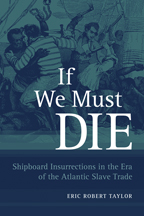
288 pages / 6.00 x 9.00 inches / 5 halftones, 1 map
If We Must Die examines nearly five hundred shipboard rebellions that occurred over the course of the entire slave trade, directly challenging the prevailing thesis that such resistance was infrequent or insignificant. As Eric Robert Taylor shows, though most revolts were crushed quickly, others raged on for hours, days, or weeks, and, occasionally, the Africans captured the vessel and returned themselves to freedom. In recounting these rebellions, Taylor suggests that certain factors like geographic location, the involvement of women and children, and the timing of a shipboard revolt, determined the difference between success and failure. Taylor also explores issues like aid from other ships, punishment of slave rebels, and treatment of sailors captured by the Africans. If We Must Die expands the historical view of slave resistance, revealing a continuum of rebellions that spanned the Atlantic as well as the centuries. These uprisings, Taylor argues, ultimately helped limit and end the traffic in enslaved Africans and also served as crucial predecessors to the many revolts that occurred subsequently on plantations throughout the Americas.
“Eric Robert Taylor has written a book that is long overdue. He provides the first authoritative and comprehensive examination of shipboard revolts in the Atlantic Slave Trade. A product of indefatigable research . . . . this is an excellent book that should command the attention of any scholar of slavery.”—The Americas
“Well researched and ably written, Taylor’s study fills an important void in the historiography of the transatlantic slave trade.”—Journal of American History
“A trailblazing book. . . . thoroughly researched and well written, and should be of great interest to students and scholars of slavery, the slave trade, and the history of the African diaspora in the Americas.”—Journal of African American History
“The real strength of this work is the way Taylor’s analysis follows his evidence. . . . He sees complexity and contingency and gives full play to the full spectrum of human responses to these extreme circumstances.”—Journal of Southern History
“Taylor’s work is a valuable contribution to the growing body of scholarship concerning slavery and the slave trade.”—North Carolina Historical Review
Found an Error? Tell us about it.